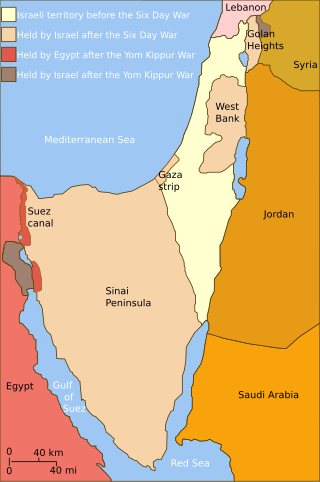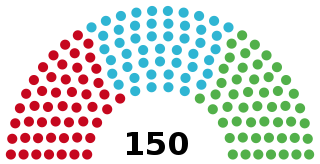Related Research Articles
The Jarring Mission refers to efforts undertaken by Gunnar Jarring to achieve a peaceful settlement of the conflict between Israel and its Arab neighbors after the Six-Day War in 1967.

United Nations Security Council Resolution 338 was a three-line resolution adopted by the UN Security Council on 22 October 1973, which called for a ceasefire in the Yom Kippur War in accordance with a joint proposal by the United States and the Soviet Union. It was passed at the 1747th Security Council meeting by 14 votes to none, with China abstaining.
Nicolas Michel is a Swiss lawyer who serves as an adjunct professor of international law at the Geneva Graduate Institute of International and Development Studies.
A Special Envoy of the Secretary-General (SESG) is a senior United Nations official appointed by the United Nations Secretary-General to deal with a set of specific issues.

Staffan de Mistura is an Italian-Swedish diplomat, United Nations official and former member of the Italian government.
Constructive ambiguity is a term generally credited to Henry Kissinger, said to be the foremost exponent of the negotiating tactic it designates. It refers to the deliberate use of ambiguous language on a sensitive issue in order to advance some political purpose. Constructive ambiguity is often disparaged as fudging. It might be employed in a negotiation, both to disguise an inability to resolve a contentious issue on which the parties remain far apart and to do so in a manner that enables each to claim obtaining some concession on it.
The Syrian peace process is the ensemble of initiatives and plans to resolve the Syrian civil war, which began in 2011 and spilled beyond its borders. The peace process was moderated by the Arab League, the UN Special Envoy on Syria, Russia and Western powers. The negotiating parties were representatives of the Syrian Ba'athist regime and the Syrian opposition. The Autonomous Administration of North and East Syria was excluded at the insistence of Turkey. Radical Salafist forces including the Islamic State of Iraq and the Levant have not engaged in any contacts on peaceful resolution to the conflict.
The Kofi Annan peace plan for Syria or the six-point peace plan for Syria was launched in March 2012 by the Arab League and the United Nations (UN), when the violent Syrian conflict or civil war had raged for a year.

The National Coalition of Syrian Revolution and Opposition Forces, commonly named the Syrian National Coalition (SNC), or the Syrian National Revolutionary Coalition (SNRC) is a political organization founded in Doha, Qatar, in November 2012 during the Syrian Civil War in an attempt to coalesce the various opposition movements to Bashar al-Assad's Ba'athist regime.
The U.S.–Russia peace proposals on Syria refers to several American–Russian initiatives, including joint United States–Russia proposal issued in May 2013 to organize a conference for obtaining a political solution to the Syrian Civil War. The conference was eventually mediated by Lakhdar Brahimi, the United Nations peace envoy for Syria.

The Geneva II Conference on Syria was a United Nations-backed international peace conference on the future of Syria with the aim of ending the Syrian Civil War, by bringing together the Syrian government and the Syrian opposition to discuss the clear steps towards a transitional government for Syria with full executive powers. The conference took place on 22 January 2014 in Montreux, on 23–31 January 2014 in Geneva (Switzerland), and again on 10–15 February 2014.

The Vienna peace talks for Syria, as of 14 November 2015 known as the talks of the International Syria Support Group (ISSG), were negotiations of foreign powers that began in Vienna, Austria in October 2015 at the level of foreign ministers, to resolve the conflict in Syria, after unsuccessful previous Syrian peace initiatives.

The United Nations Security Council Resolution 2254 was unanimously adopted on 18 December 2015. It called for a ceasefire and political settlement in Syria as a means to end the civil war. The document described the roadmap for Syria's political transition.
The Geneva peace talks on Syria, also known as Geneva III, were intended peace negotiations between the Syrian government and opposition in Geneva under the auspices of the UN. Although formally started on 1 February 2016, they were formally suspended only two days later, on 3 February 2016.

The High Negotiations Committee (HNC) is an umbrella body which was created to represent the Syrian opposition in the Geneva peace talks in 2016. It is led by Riyad Farid Hijab, who was Prime Minister of Syria from June to August 2012. It was considered to be Syria's main or broadest opposition bloc.

The Geneva peace talks on Syria in 2017, also called the Geneva IV, V, VI, VII, & VIII talks, were peace negotiations between the Syrian government and the Syrian opposition under the auspices of the United Nations. The Geneva IV talks took place between 23 February and 3 March 2017, trying to resolve the Syrian Civil War. The Geneva VII talks began on 10 July 2017. The Geneva VIII talks were initially scheduled to begin on 28 November 2017.

The Astana Platform was created after several meetings in Astana between members of Syrian opposition forces. Until it ceased its activities in 2023, the platform was headed by the Syrian politician Randa Kassis.

The Libyan peace process was a series of meetings, agreements and actions that aimed to resolve the Second Libyan Civil War. Among these were the Skhirat agreement of December 2015 and the plans for the Libyan National Conference in April 2019 that were delayed because of the 2019–20 Western Libya campaign.

The Syrian Constitutional Committee is a United Nations-facilitated constituent assembly process that seeked to reconcile the Ba'athist regime of President Bashar al-Assad and the Syrian opposition, in the context of the Syrian civil war, by amending the current or adopting a new Constitution of Syria. The UN hopes that this would lead to negotiations which would subsequently lead to a peaceful end of the conflict, which had been raging for more than eight years by the time of the committee's formation. The Constitutional Committee was formed with the formal approval of both parties involved—namely the Government of the Syrian Arab Republic and the opposition Syrian Negotiations Commission, with the facilitation of the United Nations.
References
- ↑ "Syrian Negotiation Commission – Negotiating opposition institution seeking to implement United Nations Security Council resolutions related to Syria" . Retrieved 2024-05-05.
- ↑ "الهيئة العليا للمفاوضات السورية". الجزيرة نت (in Arabic). Retrieved 2024-05-05.
- ↑ Year: 2015), UN Security Council (70th (2015-12-18). "Resolution 2254 (2015) /: adopted by the Security Council at its 7588th meeting, on 18 December 2015" (in Spanish).
{{cite journal}}: Cite journal requires|journal=(help)CS1 maint: numeric names: authors list (link) - ↑ "Syrian Negotiation Commission – Negotiating opposition institution seeking to implement United Nations Security Council resolutions related to Syria" . Retrieved 2024-05-05.
- ↑ spare (2016-09-07). "Syrian Opposition Sets out Executive Framework for Political Solution in Syria". Syrian National Coalition Of Syrian Revolution and Opposition Forces. Retrieved 2024-05-05.
- ↑ "Final Communiqué of the Action Group for Syria (Geneva Communiqué) | UN Peacemaker". peacemaker.un.org. Retrieved 2024-05-05.
- ↑ Year: 2013), UN Security Council (68th (2013-09-27). "Resolution 2118 (2113) /: adopted by the Security Council at its 7038th meeting, on 27 September 2013".
{{cite journal}}: Cite journal requires|journal=(help)CS1 maint: numeric names: authors list (link) - ↑ Year: 2015), UN Security Council (70th (2015-12-18). "Resolution 2254 (2015) /: adopted by the Security Council at its 7588th meeting, on 18 December 2015" (in Spanish).
{{cite journal}}: Cite journal requires|journal=(help)CS1 maint: numeric names: authors list (link) - ↑ "Staffan de Mistura, United Nations Special Envoy for Syria Briefing to the Security Council on the outcomes of Geneva 4 | The United Nations Office at Geneva". www.ungeneva.org. 2017-03-08. Retrieved 2024-05-05.
- ↑ "Syrian revolution forces and opposition expanded conference issues final communique". spa.gov.sa (in Arabic). Retrieved 2024-05-05.
- ↑ "Transcript of Press Conference by UN Special Envoy for Syria, Mr. Staffan de Mistura | The United Nations Office at Geneva". www.ungeneva.org. 2017-12-14. Retrieved 2024-05-05.